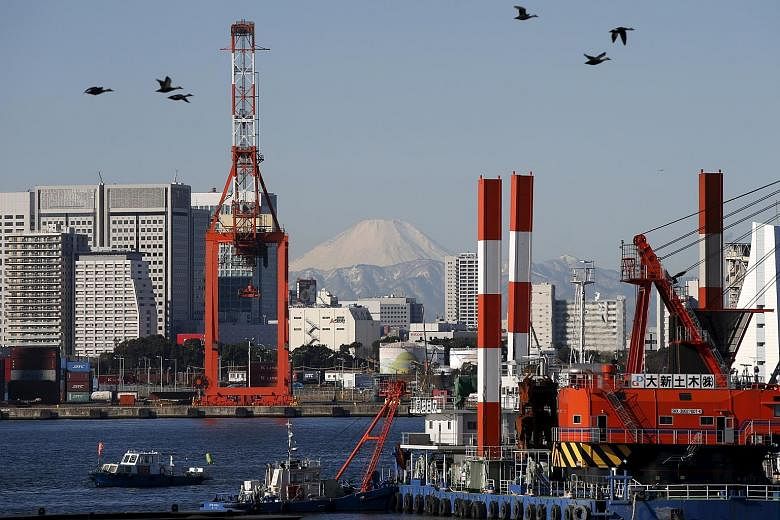TOKYO • Japan's annual trade deficit has narrowed almost 80 per cent from a record level as energy import costs fell and the weaker yen helped spur a modest increase in exports.
The balance has been negative for 49 of the 58 months since the March 2011 earthquake and tsunami. Fuel imports soared after the disaster devastated a nuclear power plant and prompted Japan to shut down its atomic reactors for extended periods.
More recently, the slowdown in China and weakness in the global economy have hurt exports, even as declines in the yen make Japanese goods more competitive overseas.
The trade balance, which swung back to a surplus of 140.2 billion yen (S$1.7 billion) in December, was in deficit for nine months last year.
Exports declined 8 per cent in value last month and imports fell 18 per cent. The annual trade deficit was 2.8 trillion yen.
"Exports haven't grown much, but the trade deficit has narrowed because commodity prices are slumping more than expected," Mr Atsushi Takeda, economist at Itochu Corp in Tokyo, said yesterday after the data was released.
"I don't think that's necessarily a good thing. If you think the decline in oil prices has gone too far, imports will increase again and widen the trade deficit eventually."
In December last year, Japan's exports to China fell 8.6 per cent and were down 3.4 per cent to the United States, compared with a year earlier.
Meanwhile, exports to the European Union rose 3.1 per cent for the month compared with a year earlier - with exports of cars, auto parts, and iron and steel behind the gain.
Economists are watching data releases with particular interest this week, as the Bank of Japan (BOJ) will hold a policy meeting on Thursday and Friday. Waning inflation expectations, lower oil prices and a reversal in the yen's declines have put pressure on the BOJ to expand its already-record stimulus programme.
"The BOJ has run out of excuses. I think they will have to make a move this week," said Mr Yuichi Kodama, chief economist at Meiji Yasuda Life Insurance in Tokyo, which oversees US$299 billion (S$428 billion) of assets as of March.
"If they don't act, the yen will likely make a big move and easily slice through 115 per dollar, sending stocks tumbling. This data has more or less confirmed that they will take action."
Japanese shares rose a second day, with the Topix index increasing 1.7 per cent to be on target for its highest close since Jan 15. The yen, which typically moves at odds with Japanese stocks, was little changed at 118.74 per dollar, following a 0.9 per cent decline last Friday that capped its first weekly drop in three weeks.
BLOOMBERG

